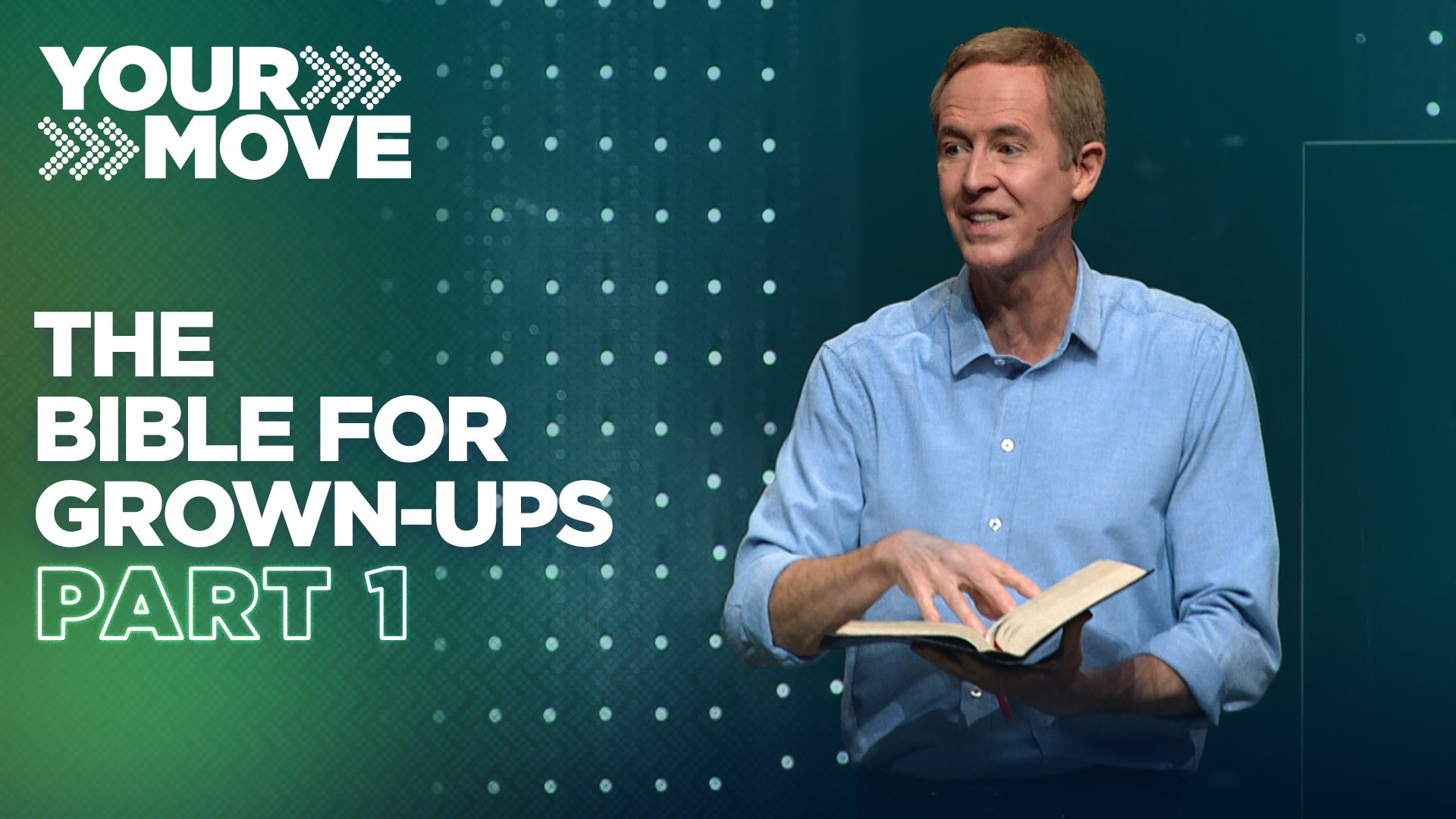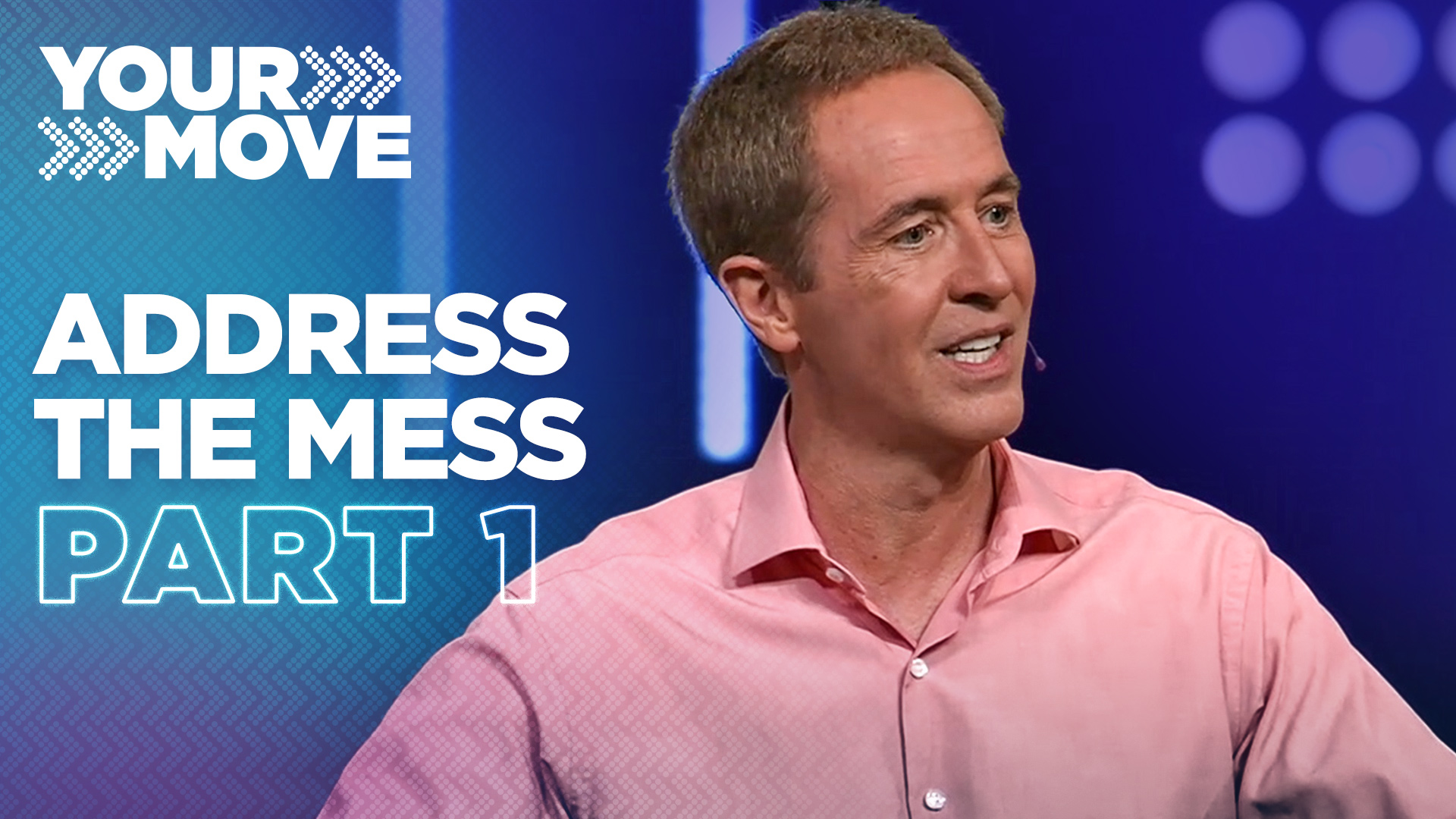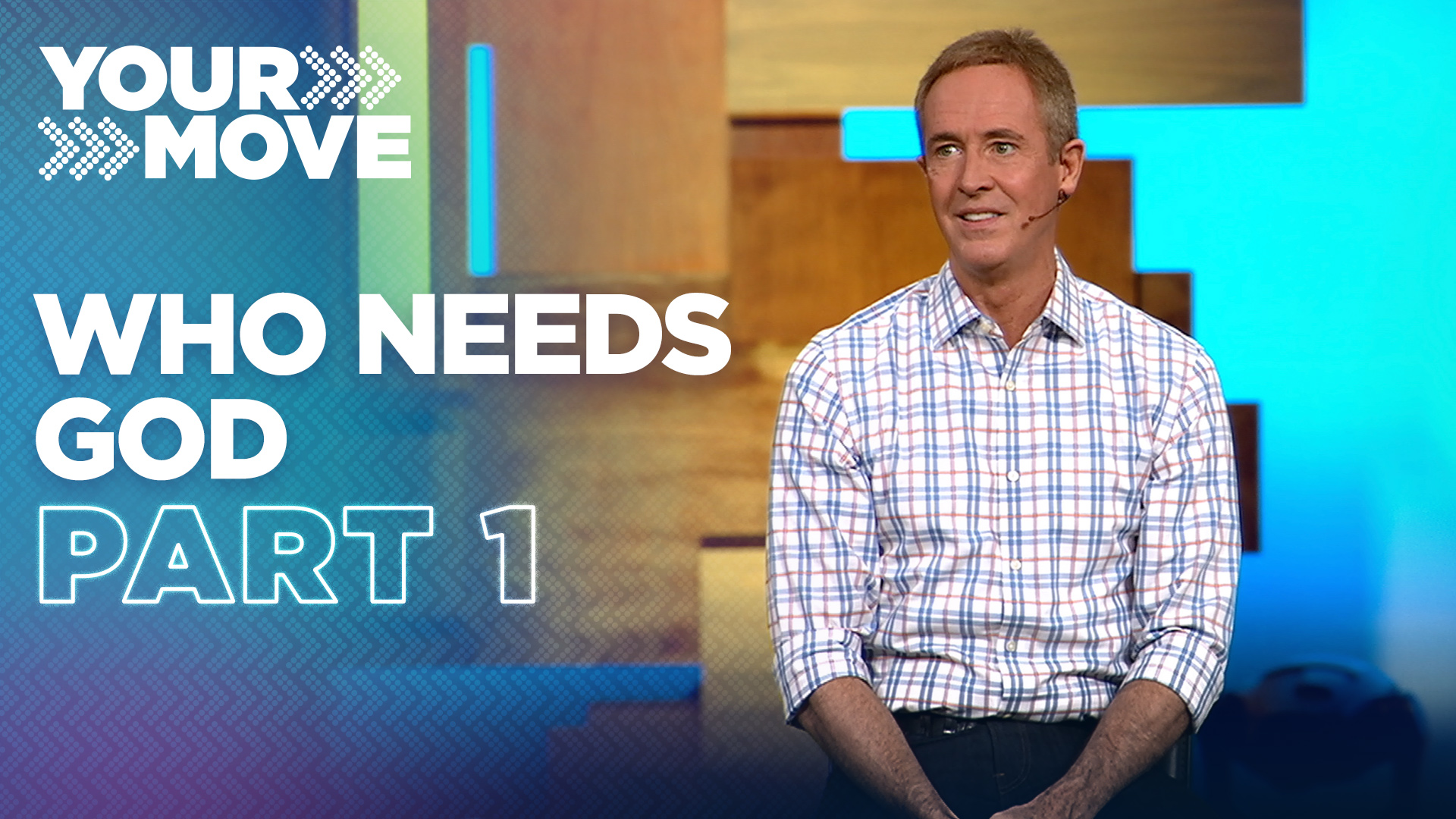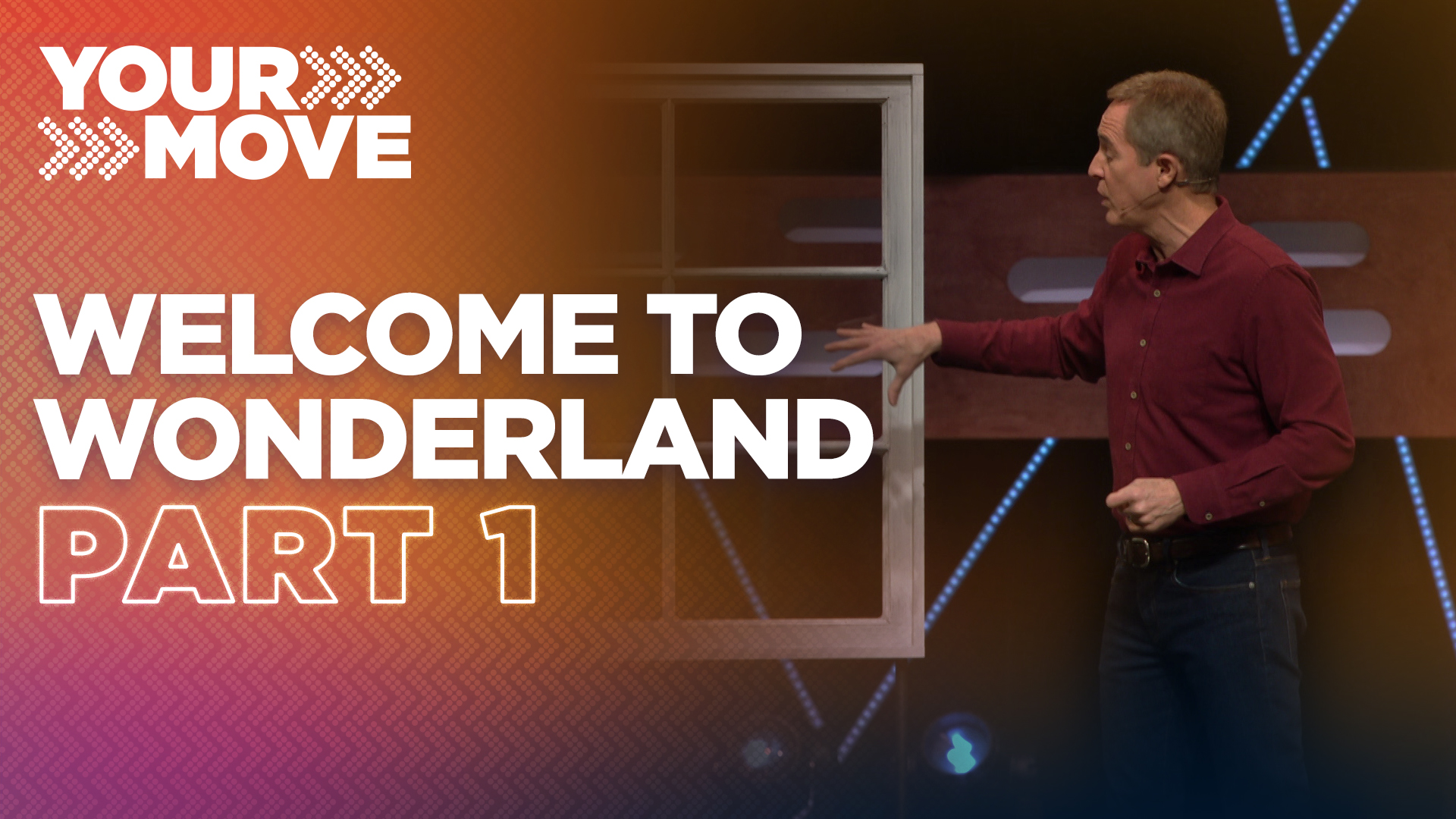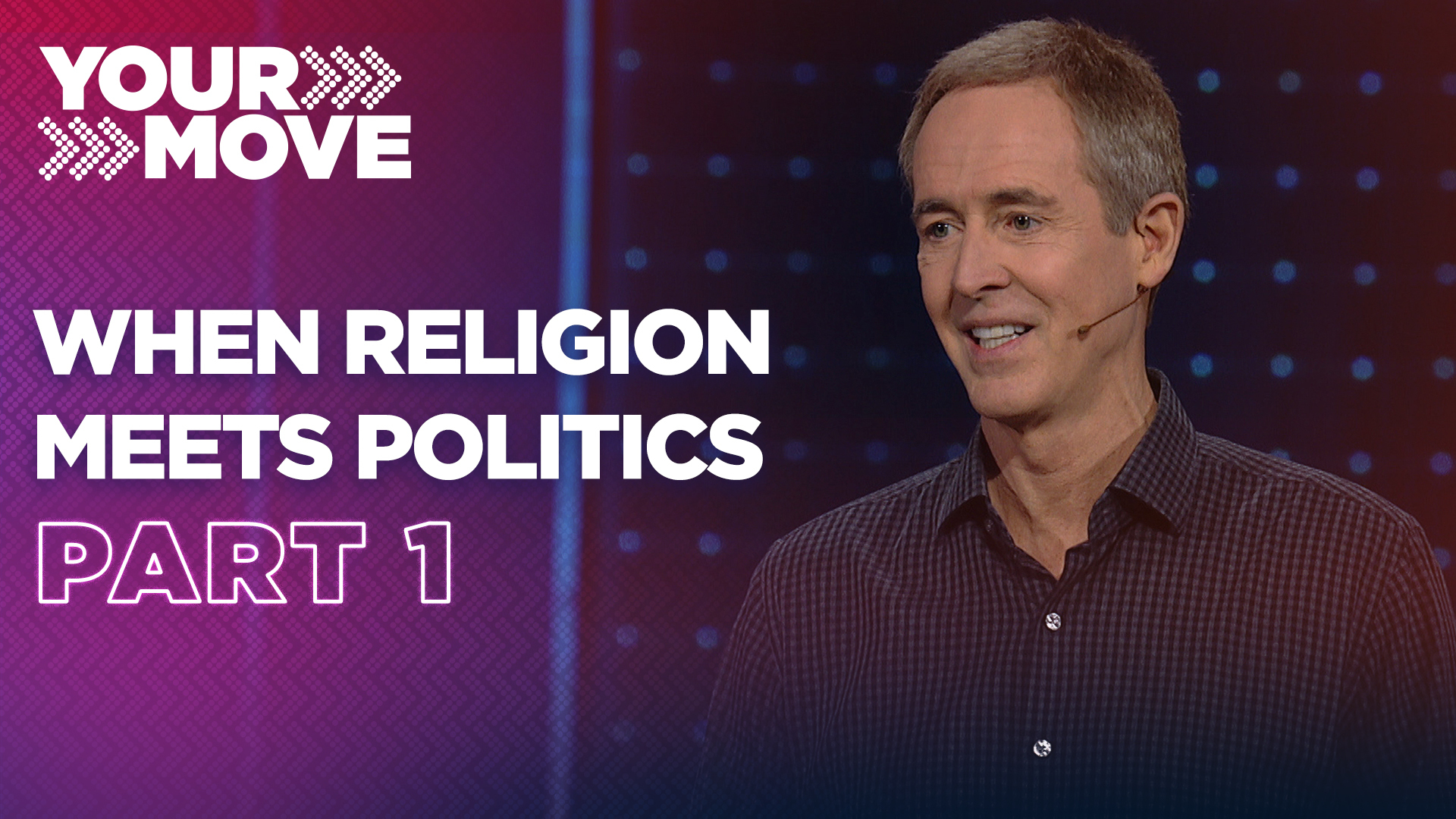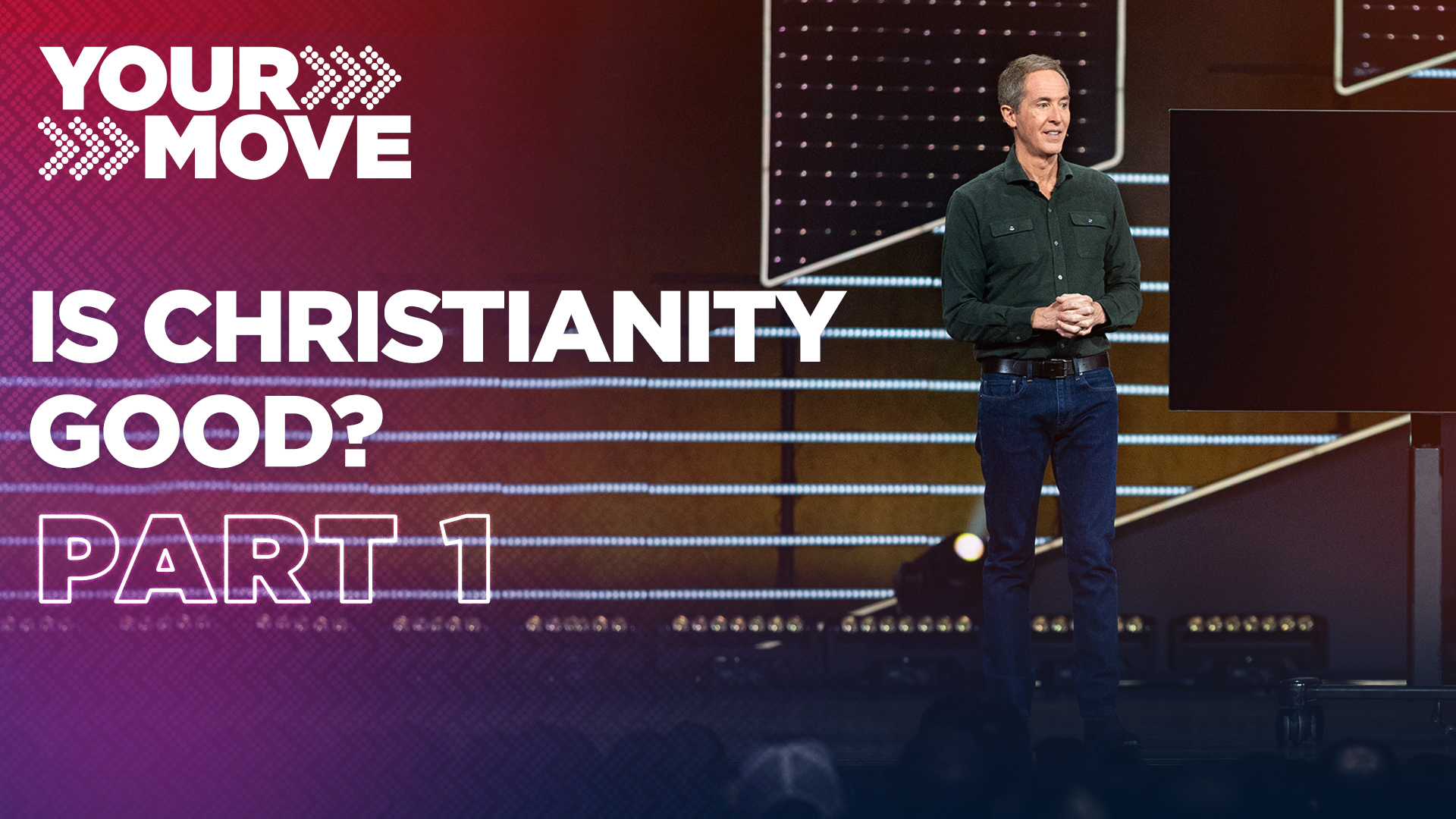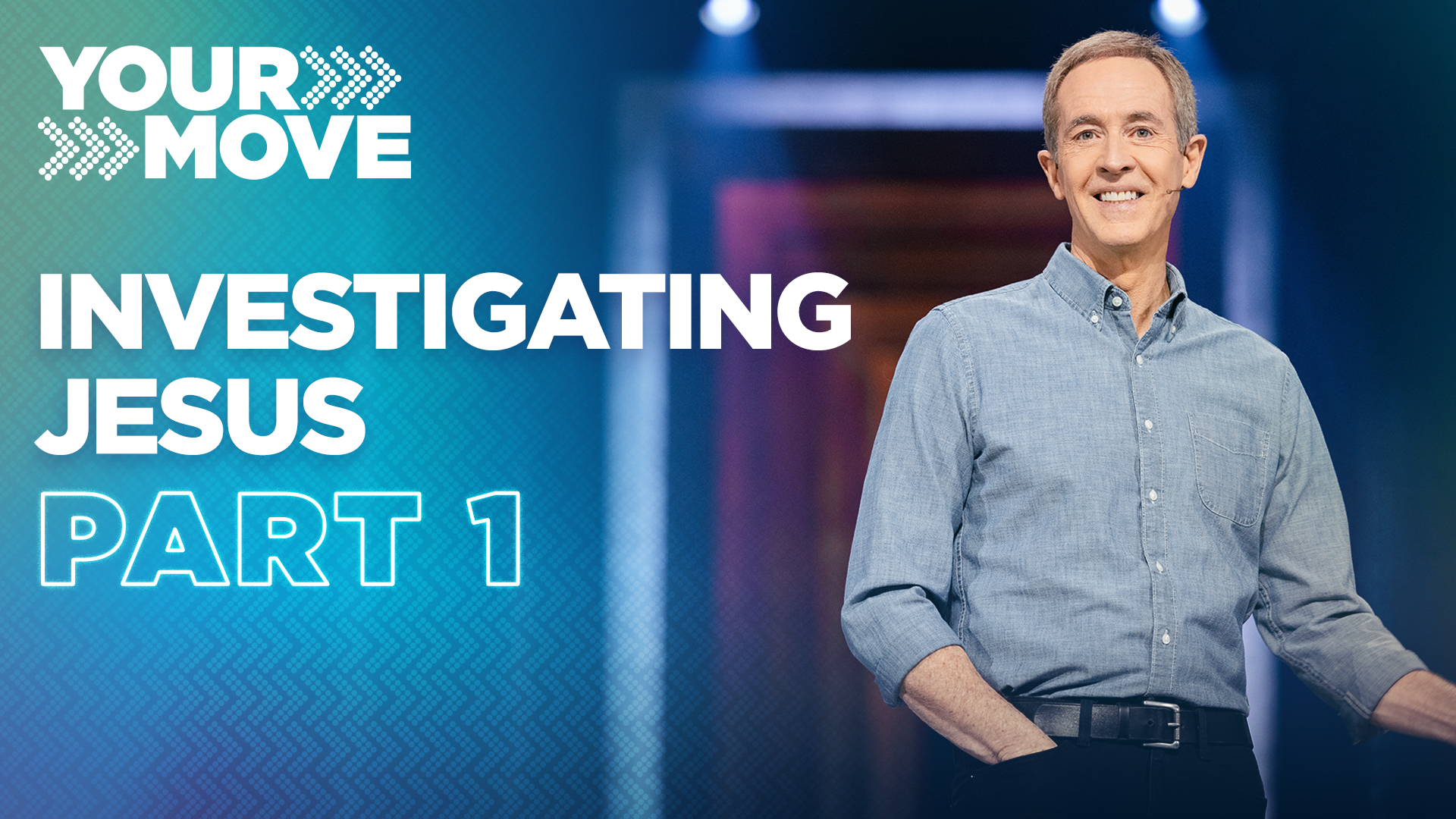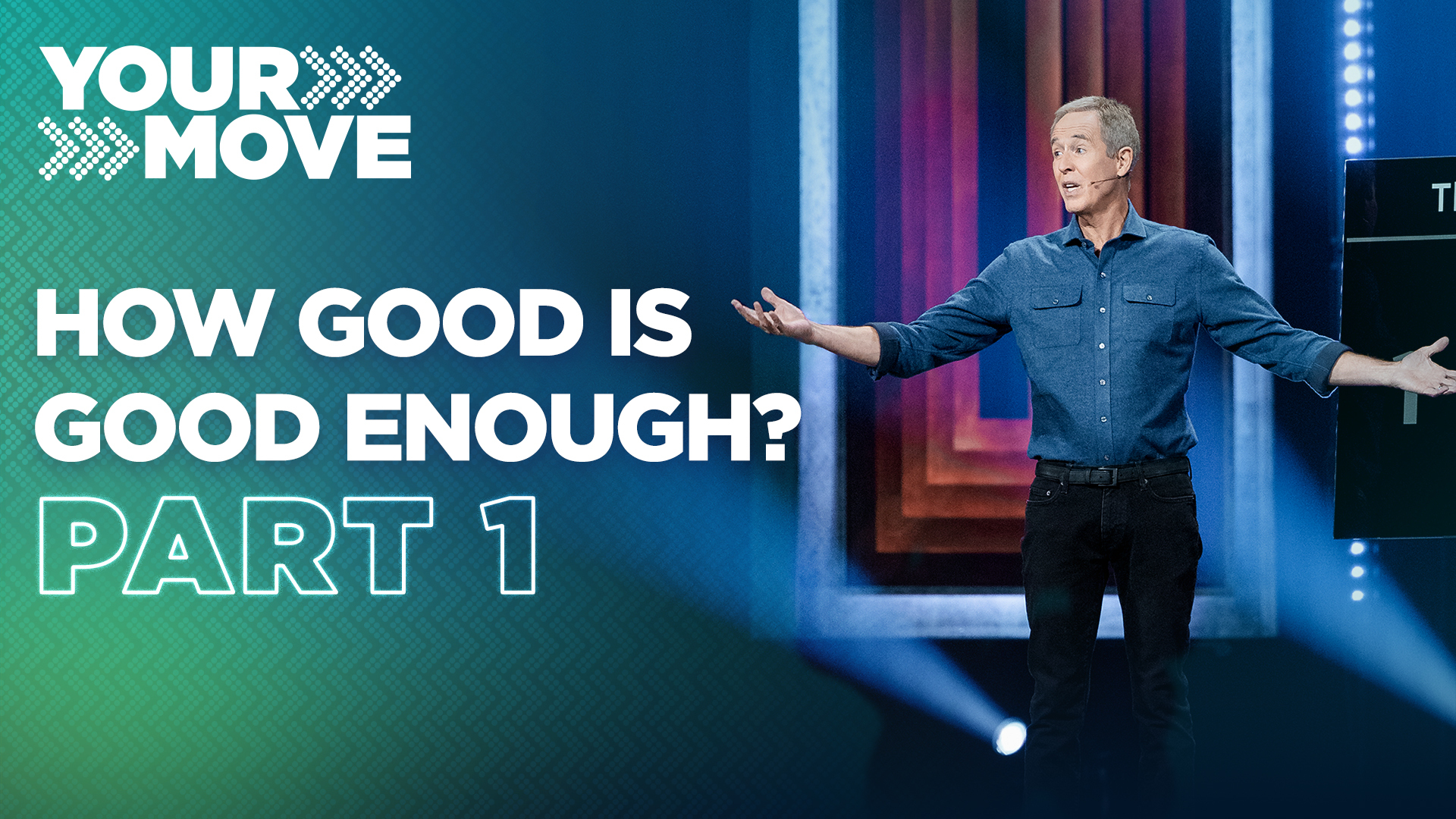We will always wonder about life’s big questions, but when it comes to faith, is there anything we can be sure of?
- Have you ever realized you hadn’t moved beyond a difficult situation or struggle from your past? Explain.
- Is there a time in your life you look back on with regret? If yes, how has that situation positively or negatively impacted the way you live your life today?
- In three words, how would you describe God? Which past experiences or circumstances have influenced your view of God?
- Was faith important in your life growing up? If yes, to what extent did your childhood experiences influence your adult faith?
- What do you wonder most about God?
NOTE: The following content is a raw transcript and has not been edited for grammar, punctuation, or word usage.
So, what about you? What do you wonder? What do you wonder? And as you listen to those voices and as you listen to those questions, what do you wonder? We all wonder and sometimes wonder leads to fear. Right? In fact, sometimes we wonder because we’re afraid. But sometimes wonder leads to courage, sometimes wonder leads to discovery.
In fact, some of the greatest discoveries, some of the greatest breakthroughs in science and education and other arenas began with somebody wondering. I wonder if since the moon is round, and the sun seems to be round if perhaps the earth is round as well. We all wonder in fact, if there is a God, and I believe there’s a personal God. I think perhaps one of God’s greatest gifts to me and God’s greatest gifts to you and to all of us is the ability to think about the future and to wonder.
But as we said in part one in this series, we actually all wonder through a specific framework, and we’re illustrating that framework or that frame of reference with this window. And we all are limited in our ability to see the world the way the world really is, because our framework doesn’t provide us with all the answers.
So consequently, theists wonder. We wonder why in the world would God allow bad things to happen to good people? Some of you wonder how natural selection could provide stardust and energy with the ability to wonder. So we all wonder. But we all wonder through a very, very, specific frame of reference.
Now Christians believe and Christians have believed from the very beginning that God actually sent someone. That God actually sent someone to stand on our side of the frame to serve as a reference. To stand inside our world on our side of the frame to serve as a reference. So that in spite of all that we wonder about, in spite of all that we know and don’t know, in spite of where we are on the continuum of discovery as it relates to science, the universe, the human body and life and all the other things that we’re constantly upgrading and updating our knowledge around, that in spite of all that that we could know with certainty what God is like.
In fact, there’s a first-century writer… We looked at something that he or she said, we don’t know who wrote this. We call it the book of Hebrews. It’s actually just a sermon that was written in the first century. This first-century author says to his audience, who was beginning to lose focus in terms of their focus of Christianity and their religious frame of reference. He makes this statement we looked at in part one, he says this, or she says this, whoever wrote it said this, “Fixing”… And I love the statement, “Fixing our eyes. Fixing our eyes on Jesus who is the pioneer and the perfector of faith.” And in this one simple statement there is so much that’s so extraordinarily rich. Because with this one simple statement the author reminds us that the issue as it relates to Christianity is always Jesus.
That when it comes to a Christian worldview or a Christian frame of reference the issue is not a theology, it’s not a philosophy, it’s not even a belief system. It is a person. That Christianity begins and ends with a person. It begins and ends with Jesus.
So for those of you today… I wanna talk to two groups. I wanna talk to the group of you who would say, “You know what, I grew up in kind of a Christian… With a Christian frame of reference. I grew up with somewhat of a Christian world view, but Andy then I just ran into things, I experienced things and I just couldn’t do it anymore. I just felt like I had to leave.” And then there’s another group of you that’s thinking about leaving. In fact, \ you may consider yourself a Christian. As far as your parents know you are in. You prayed the prayer. You got the book, you know? You’ve read the Bible, But you’re having these conversations constantly and you’re not so sure how long you can stay in. There’s a sense in which you’re kind of leaning toward, or you’re reaching for the handle of faith to say, “You know what? I think I have to leave because my experience in life just doesn’t line up with the faith I was handed as a child, or the faith that I adopted as a teenager, or the faith I adopted while I was in school, college, or graduate school.”
And maybe the seeds were sown for you to leave whatever religious world you grew up in. Maybe the seeds were sown in childhood because you were taught to view the world a certain way but you realize that even your parents weren’t on the same page and later on it made it easier to question and to leave.
Or perhaps you were raised in an extraordinary home, I mean almost at a perfect home. And yet, as you got outside your perfect home you realized the world didn’t line up with your perfect home and with your perfect belief system.
Or perhaps, it was when you went to school. When you went to school you discovered things you’d never discovered before, never been taught before. And whether it was high school or college or graduate school or med school or law school, as you continue to build and build and build your education here is something you shouldn’t deny, and we can’t deny. That our education becomes a filter through which we see, and view, and interpret the world. And then there’s this one.
Our religious experience. Whether it was in a church or a temple or a mosque. This began early on for many of us to be a filter through which we viewed and interpreted the world. And again, you may have had an extraordinary church or temple or mosque experience, or perhaps you had a disruptive one. Or perhaps, like many people in the south especially, you grew up with a very legalistic one. And you felt like if you weren’t perfect you couldn’t stay. And your older brother and your older sister, they were perfect. This worked for them. It just didn’t work for you. And whether or not this is still a part of your life, or used to be a part of your life, here’s something you can’t deny and we shouldn’t deny, that whatever kind of religious upbringing we had, whether we stayed with it or walked away from it, it jaded us. It became a filter through which we see all religion and all responses to religion.
Then there’s this. You screwed up, didn’t you? You messed up. You have things in your life you hope no one knows about. You have regret, we all do. You violated your own rules. It may have begun by violating the rules that you were handed in your religious upbringing, but then you walked away from this perhaps, or you tweaked this, or you kind of edited this, but no matter how far away from this you drifted there are things that you’ve done that you’re just ashamed of. There’s a season where you just… You just… The anger that you carried from whatever it was, whatever previous relationship it was, you know that it leaked out on the people around you. And this is the season of life you wish you could go back and undo. And to some extent, it was informed by this. And to some extent you might have even excused it because of this. But this is a permanent part of your story, just as it is a permanent part of mine.
Then, you got the worst news of your life. He didn’t want to be married anymore. She didn’t want to be married anymore. Your parents split up, you found out it was terminal, and you couldn’t imagine life without him, you couldn’t imagine life without her. We all have those pains in our window. And then there’s this one. This is just that thing that you just can’t get past. There’s an insecurity that you live with and It becomes a cage that locks you in and locks other people out.
Or perhaps it’s fear. And you don’t know where the fear comes from. You just know you have more fear and more anxiety than the average person, and you’ve taken things for this, you’ve talked to people about this. Or this may be something to do with your physical body, your appearance. And it may be that thing in your appearance that no one else notices but you, but every time you look in the mirror it is all you see and it feeds this deep insecurity. And again, you know it’s not rational, you know it’s not logical. In fact, whenever it comes up in conversation, you’re able to sort of laugh about it, but it is so deep. It is that thing that keeps you from going, that keeps you from showing up, that keeps you from speaking up, that keeps you from living life.
Now, we’re all adults so hopefully we can all acknowledge this. We all want to think we are bigger than all of this. We all wanna convince ourselves that this does not impact the way that we see the world.
But that’s not true. Your frame of reference is your frame of reference, and it is marked and it is shaded and it is jaded by things that you participated in and things that you had no control over. And the proof is this, where often times we cannot see how this has affected us in the mirror, it is very clear to us how these things have affected other people, right? When you heard your dad’s entire story, maybe it was after he passed away and your mom finally told you, or a grandparent finally told you, it was like, “Oh, now I know why he was the way he was.” When we get a glimpse of other people’s frame of reference, their life makes sense to us and we know that their experience and their response and their responses are a reflection of what’s in the windowpanes of their life. And my friends, come on, it’s true of me. It’s true of you.
Now, here’s the powerful, powerful thing. When Jesus showed up on the planet, his first century followers, they had a window frame full of jaded panes. When he showed up the frame of reference was so distorted, it was so off, it was so marked, it was so marred that the first-century frame of reference included things like this, that if you’re sick, it’s because God is punishing you. And if you’re healthy, it’s because God loves you. This is what people believed. They believed that God loved the wealthy people, that’s why they were wealthy. And if you were poor, or if you had a disease or an illness, it’s because God had cursed you and was angry with you. This was how they viewed the world.
In terms of the afterlife, their religious leaders weren’t even consistent on whether or not there’s anything on the other side of this, so they wondered is there more to life than this life? And so God did for them what he ultimately did for us. He sent someone. He sent someone. He sent someone to stand on their side of the frame to serve as a frame of reference.
This is what Christmas is really all about.
Toward the end of Jesus life he told his guys, he said, “Hey listen, I wanted to celebrate Passover together.”
Now, they didn’t know it but this would be their last Passover together. Because a few hours after Passover Jesus would be arrested and tried and ultimately crucified.
And so, he’s got the guys together and it’s this fabulous, interesting, intricate conversations that he has with them. And during one of these conversations, the Apostle John documents this for us in the Apostle John… Matthew, Mark, Luke, John, the fourth Gospel writer, wrote some letters.
During this conversation, Jesus gives them the worst news possible. He says, “Guys, just heads up, I’m leaving.” They said, “Wait, wait, wait, we didn’t wanna come here to begin with, okay? To Jerusalem. And now you’re leaving?” And they took that to mean like you guys stay here I’m leaving. Okay? And if Jesus leaves they’re in trouble, because the only reason they weren’t already arrested is because they were with Jesus and wherever Jesus went there was a crowd and the crowds protected Jesus. Now, it’s late at night, they’re in this upper room. It’s this secret place, they made sure nobody knew exactly where they were, and they’re celebrating Passover together. And Jesus says, “Oh yeah, by the way, I’m leaving.”
So, Simon Peter who was generally the spokesman for the guys said this, Simon Peter said, “Lord, where are you going?” And Jesus replied, “Where I am going, you cannot follow now but you will follow later.” To which Peter must have thought, “That’s not what I asked. [laughter] But that is what I meant. How does he do that?” [laughter] Peter asked, “Lord why can’t I follow you now? I will lay down my life for you.” And here’s what he’s probably thinking, “Okay, if I stay here I’m probably gonna lay down my life anyway because they’re gonna arrest the rest of us because the crowd follows you the crowd doesn’t follow us if they know you’ve left. And so if I’m gonna lay down my life I wanna lay down my life with you and for you.” Or perhaps he thought, “Maybe you’re leaving to proclaim yourself as Messiah. But Jesus I just want you to know wherever you go you can count on me. You can take me because I will stand with you and I’m willing to die for you if needs be.”
And do you know what Peter was doing? Peter was doing what we all do all the time. He was looking at life through the window of his own insecurity, through what he was taught about Messiah, his own failures, and the disappointments that he’d experienced in life. And he says “Jesus count on me, count on me.” And then Jesus… I think he smiled. I don’t think Jesus was angry in this moment. Jesus smiles. And the text says, “And Jesus answered, will you really lay down your life for me?” And he’s like, “Oh yeah I will.”
And he puts his hand on his shoulder perhaps and he says, “No. “Very truly I tell you before the rooster crows,” that is before the Sun gets high in the sky, “you’re gonna disown me. Not only are you not gonna lay down your life for me, you’re gonna disown me three times.” Well this is so disturbing. I mean, this just doesn’t make any sense. And then a few verses later Jesus again, the master teacher, he says to this same very troubled group of men, “Guys, do not let your hearts be troubled.” “But Jesus, you just told us you’re leaving.” And then this next statement Jesus makes… And again, I wish we had time to delve into the complexities of this. But this next statement they should have all gotten up and left the room. He said to them, and John documents it, and John believed it, and now he says to you and he says to me, “Guys don’t you believe in God?”
“Yeah.” “Well, believe also in me. Guys don’t you believe in God the way you understand God out there somewhere?” “Yeah we do.” Jesus says, “Look, look, believe also in me.” To which they’re like, “Wait, wait, wait, hang on, hang on. Okay, telling us about God is one thing, claiming equality to God? That’s something entirely different. Telling us about God, explaining God… In fact, that’s what we want you to do. We want you to explain God to us because we want to understand. But to sit in the room with us and look at us and say hey look at me you believe in God you can believe in me the same way you believe in God? We can’t do that. That’s blasphemous. This is the kind of thing that gets you in trouble all the time.” And then he goes into this thing that perhaps if you grew up in church you heard as a child and maybe you heard it said a little differently, each translation tries to capture the tone of these interesting words. He says, “My father’s house, God’s house, has many rooms; if that were not so would I have told you that I am going there to prepare a place for you?” What are you even talking about? And he keeps going. And if I go and prepare a place for you, Peter pay attention, I will come back and I will take you to be with me that you also may be where I am.” And now it’s starting to dawn on them. And then he says this, “And by the way, guys, you seem so confused but you know the way to the place where I’m going. You know the way to the place where I’m going.”
And they’re like, “No, we don’t know where you’re going, we don’t know why you’re going, we don’t know why you feel like you have to leave and why you have to leave us and then you’re gonna take us there.” So Thomas… I mean, Thomas is like, “Okay.” You know, raises his hand or maybe just blurts out. Thomas said, “And Lord we don’t know where you’re going so how can we know the way?” If we’re gonna get to where you’re going we need to know the way there.
And then Jesus makes a statement that’s famous now but is usually ripped completely out of this incredible, incredible context. In fact, if you’re not a Christian this is one of those things maybe Christians have said to you and it’s like okay I can’t go there, or maybe if you’re reaching for the door to leave it’s because of the way this next phrase has been interpreted for you.
Because this next statement that Jesus makes has been used by the church to exclude people and to stiff-arm people, but when you read it within this context Jesus is not trying to keep anybody out. Jesus is trying to make the case, “I’ve come to your side of the frame of reference to be a reference because your heavenly Father wants everybody in. Why do you think I’m here?”
Thomas says, “Jesus, just show us the way. If you’ll tell us the way we’ll get on that path and we’ll be there whenever you want us there.” And Jesus smiles and says, looks at them because they’re all looking out here, “Show us the way.” And Jesus says, “I am the way.” Guys, it’s not out there somewhere. You don’t have to figure this out. You don’t have to work past what you knew or didn’t know. You don’t have to work past all of your pain. And, there are things that you learned as kids. You know, that was helpful. Some not so helpful. Guys, guys. He would say, “Look at me. You’re looking at the way. You don’t have to figure out what is truth. Guys, you’re looking at as much truth as you’ll ever be able to comprehend about God in this lifetime. And guys, “I have come to offer you eternal life.”
Later John would say that Jesus was praying, and his prayer… [chuckle] He says, “Yeah, I’ve come to give them life,” and then Jesus defines eternal life. We think about eternal life starts once you die and then you live in heaven, or don’t go to heaven, or however you were taught. Jesus was clearer than that. He said, “This is eternal life. This is the life I’ve come to offer, that they may know… ” He was talking to God. “That they may know You, and Your Son whom you sent.” That this is eternal life, that on this side of the frame of reference, on this side of life that we could know what God is like, and Jesus says, “That is life.”
It doesn’t take away all the mystery. It doesn’t take away all the wonder. But it addresses your primary wonder and it removes a very important mystery. What is God like? And does God like you? [chuckle] And then he does that equate himself with God thing again. “No one comes to the Father except through me.” And this wasn’t a, “Hahaha. You can’t get to God unless you line up in front of me.” His point was instead of trying to figure out what it’s like on the other side, the invitation is wide open to every single person, regardless of their pain, regardless of what they know and don’t know, regardless of how they were raised, regardless of what they’ve done, and regardless of how they viewed God before this, and regardless of their fear and their insecurity. Everybody is welcome, and everybody… See, this is a statement of equality, not exclusion. And, everybody gets in the very same way. “If you really knew me,” he says… “If you really know me, you will know my Father as well.” [chuckle] Wait a minute. You’re telling us to know you is to know the Father? “That’s what I’m telling you. You would know the Father as well. “From now on, you do know Him, and you have seen Him.”
[chuckle]
Again, they’re so literal. Of course they are. It’s like, “Wait. No. We haven’t seen Him. We haven’t seen Him.
So, they are going back and forth. You know, “My house has… My father’s house.” “We didn’t even know your father had a house, it’s not the temple, are you talking about dying and coming back or are we going with you, we don’t wanna die, but if we die, you know… What are you talking about?” So then Phillip said, Jesus, just show us the Father… ” I love this. “And that will be enough for us.” Okay? I am sure what you just said is really important, we’ve written it down, but for us, for us simple men, we just want to know what God is like and if God likes us.
“Help us see clearly in spite of our sin. Help us see clearly in spite of and in light of and along with our fabulous, or not so fabulous education. We wanna see God, maybe not the God we were presented with as children, but if part of that is true, or if some of that’s true, that’s fine too. We just wanna know. We wanna know how much of this is true and we need to be able to see past our fear. And past our insecurity. And past our inability and unwillingness to interact at the level that some times we want to but we are just afraid. Jesus, just help all of us, we are all different men and our windows look different, but we just want to see God.” And Jesus said, “Don’t you know me Phillip? Even after I’ve been among you for such a long time? Phillip, look, look, look. Phillip, quit looking out there. Look, right here. I am in the room with you. I am here with you.
Guys, I know that you’re tired of hearing me say these things. I know this is offensive. I know that if this gets outside the room, we’re all in trouble. But anyone who has seen me has seen the Father. Your heavenly Father wants you to see. Your heavenly Father wants to be clear. Your heavenly Father wants you to know what your heavenly Father is like. He wants you to see. That’s why he sent me. That with all the mysteries and all the wondering and all there is yet to be discovered and figured out, in the meantime your heavenly Father wanted this to be clear so He sent a person.”
Then he says this and this is the issue. ” This is the whole thing right here. Believe me. Believe me. Everything else is secondary. Everybody else is secondary. This is where the clarity comes from. Not all of that…
This. “Believe me. Believe me when I say that I am in the Father, and the Father is in me.” And then the next part is fabulous. He didn’t ask them just to believe because he said it. He goes further than that. He would know that later generations would need more evidence. And so he says, “Or at least, or at least believe on the evidence of the works themselves.”
Why in the world does this confused group of people who keep asking the same question over and over and over and can’t seem to get it. Why is it that after they watch Jesus die the most shameful death imaginable? Why is it they walked into the streets, the very streets where he was ultimately arrested, why is it they were able to walk into those same streets and proclaim that Jesus was in fact the Son of God, the Messiah that the Jews had been waiting for all along?
Why? It was not what he taught. It’s not what he said. It wasn’t that little pep rally challenge in the upper room during Passover. It was because of the resurrection. Their faith was reborn based on the evidence of the works themselves.
When they saw him alive, they fixed their eyes on Jesus, and they never took them off and they changed the world. Jesus’ point is simply this… And if you left, this is the point I wanna leave with you. And if you’re thinking about leaving, this is the point I want you to consider before you leave. And if you have never been on the inside of the Christian faith and you’ve always stood on the outside because there are so many unanswered questions, or maybe you knew too many Christians, who knows. Here’s the thing to ponder. If you look past me, if you stop short of me, if you take your eyes off of me, you may miss the Father. “I am as close,” Jesus would say, “I am as close as you’ll ever come to knowing what God is like in this life.
I am as close as you’ll ever know what God is like in this life. Fix your eyes on me.”
So, if you’ve wondered, and then you wandered, here’s that thing you need to ponder. Come on. What was the faith? What was the faith you lost fixed on and fastened to? What was the faith that you lost, fixed on, and fastened to? Or if you’re looking for the door, what is the faith? What is the faith you’re losing fixed on or fastened to? Is it the Church? That’s not what you’re to fix your eyes on. Is it a version of Christianity that de-scienced or labeled people? That’s not what you’re supposed to fix your eyes on. Is it something in the Old Testament?
If you’re hung up on something in the Old Testament, Jesus would say, “Okay, I understand that. I understand how you were taught. I understand how you were raised. I understand what happened. But I’m just telling you, it’s a new day. Fix your eyes on me.” Were your eyes fixed on or are your eyes fixed on some version of faith that says bad things can’t… Or a good God wouldn’t let bad things happen to good people? Jesus would smile and say, “Are you kidding me? Are you kidding? The worst thing imaginable happened to the best possible person. I don’t know where you got that idea. You did not get that from my Father in heaven. Fix your eyes on me.”
Here’s the bottom line, we will always wonder. But in the days of Caesar Augustus, the son of the divine Julius, God sent His son to be the light of the world, to stand with us so we would not have to wonder we stood with Him. That’s the one thing we never ever have to wonder about.



